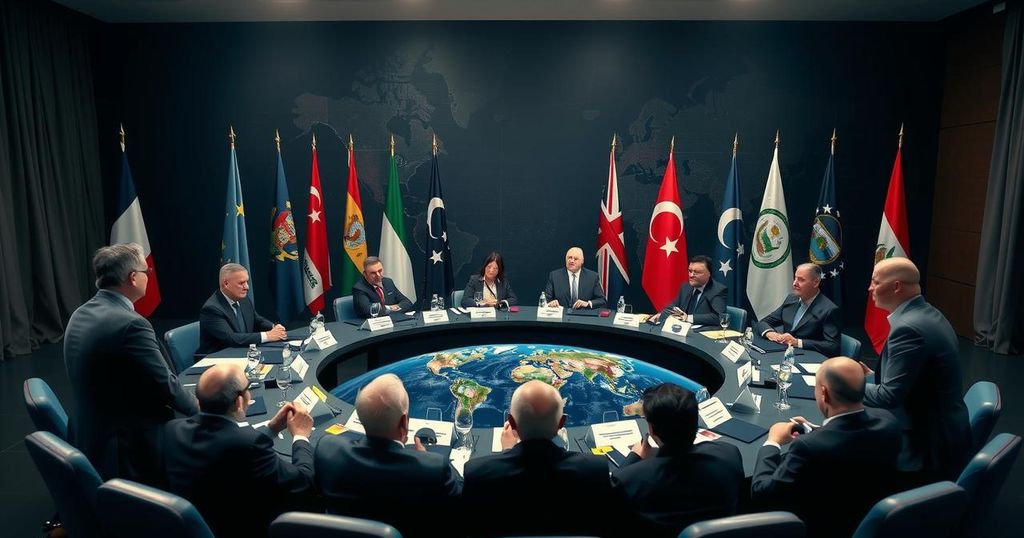The G20 summit in Brazil is set to address critical issues such as the conflicts in the Middle East and Ukraine, the climate crisis, and the return of Donald Trump to the U.S. presidency. Brazilian President Lula welcomes world leaders, emphasizing the importance of tackling poverty and hunger, while navigating geopolitics and the outcomes of the summit amid a backdrop of international tensions.
As the G20 summit convenes in Brazil, world leaders are poised to discuss pressing global concerns, including the ongoing conflicts in the Middle East and Ukraine, the urgent issue of climate change, and the political landscape shaped by Donald Trump’s anticipated return to the White House. Brazilian President Luiz Inácio Lula da Silva extended a warm welcome to international leaders at Rio de Janeiro’s modern art museum, hoping to stimulate collaboration amidst significant geopolitical challenges. The summit occurs in the wake of Trump’s recent victory in the U.S. presidential election and represents President Joe Biden’s final gathering of the world’s leading economies, with Mr. Biden’s status as a lame-duck leader overshadowed by the influential presence of Chinese President Xi Jinping. President Lula is prioritizing topics important to him, including combating hunger, promoting climate initiatives, and advocating for increased taxes on wealthy individuals. With a changing geopolitical landscape, G20 leader conversations will be dominated by the contentious wars affecting member nations. A Brazilian foreign ministry official indicated a desire among certain countries to renegotiate the summit’s communiqué, particularly concerning wars and climate issues. President Biden’s recent decision to permit Ukraine to utilize long-range U.S. missiles within Russian territories illustrates a significant shift in policy that may prompt a reevaluation of strategies among European allies. Furthermore, the G20 must address stalled United Nations climate negotiations in Azerbaijan, especially regarding the requisite financial assistance for developing nations grappling with climate change. UN Secretary-General Antonio Guterres has called upon G20 members, responsible for 80% of global emissions, to exhibit leadership in this critical area. Security is a primary concern for the summit as it follows a thwarted bombing attempt against Brazil’s Supreme Court by a suspected extremist. This gathering serves as a concluding leg of President Biden’s diplomatic tour aimed at enhancing his environmental legacy before the impending election transition. Focus also rests on the COP29 climate conference in Azerbaijan, with leaders seeking to resolve the impasse on generating $1 trillion annually for developing nations. Brazil faces increasing climate-related challenges, including the worst wildfire season in a decade, largely attributed to severe drought conditions. Though past summits endorsed an increase in renewable energy, they refrained from explicitly advocating the cessation of fossil fuel usage. Notably absent from this summit is Russian President Vladimir Putin, who faces an International Criminal Court arrest warrant in connection with the Ukraine war. Lula expressed his desire to not allow the wars in Ukraine and the Middle East to overshadow critical issues such as global poverty, highlighting the need to address challenges faced by those living in dire conditions. The summit will also launch a new initiative, the “Global Alliance Against Hunger and Poverty,” reflecting Lula’s commitment to alleviating poverty through higher taxation on billionaires. Despite facing resistance from some members, including Argentina, the Brazilian government remains optimistic about reaching a consensus during the summit.
The G20 is an international forum that brings together major economies to discuss and address global economic and political issues. The summit provides an opportunity for leaders to negotiate on crucial topics such as international conflicts, climate change, and economic disparities. As geopolitics evolves, the discussions aim both to reach agreements on pressing matters and to foster cooperation among nations. Recently, tensions have escalated due to significant global events, including the Ukraine war and the return of Donald Trump to American politics, which add layers of complexity to international relations. The summit’s outcomes may have considerable ramifications, influencing global strategies on environmental action and poverty reduction.
In summation, the G20 summit in Brazil represents a critical gathering for world leaders to navigate complex geopolitical landscapes amid ongoing military conflicts, significant climate challenges, and the evolving political dynamics associated with the return of Donald Trump. As President Lula champions initiatives against hunger and poverty, discussions may influence future collaborative efforts towards climate finance and geopolitical stability. However, achieving consensus among divergent views remains a formidable challenge, and the impact of these deliberations could resonate internationally for years to come.
Original Source: www.france24.com






